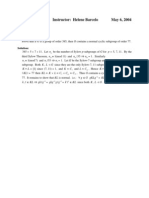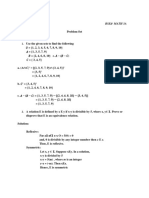Number Theory Problems
Number Theory Problems
Uploaded by
qtstarCopyright:
Available Formats
Number Theory Problems
Number Theory Problems
Uploaded by
qtstarOriginal Description:
Copyright
Available Formats
Share this document
Did you find this document useful?
Is this content inappropriate?
Copyright:
Available Formats
Number Theory Problems
Number Theory Problems
Uploaded by
qtstarCopyright:
Available Formats
Questions:
1. Which of the following diophantine equations cannot be solved?why?
(a) 6x + 51y = 22
(b) 33x + 14y = 115
2. It has been conjectured that there are infinitely many primes of the form
n^2 - 2. Exhibit five such primes.
3. Find all primes that divide 50!
4. A conjecture of Lagrange asserts that every odd integer greater than 5 can
be written as a sum p1 + 2p2, where p1 and p2 are both prime. Confirm this
for all odd integers through 75.
5. Prove: If ca congruent to cb(mod m) , then a congruent to b(mod m/d)
where d=(c,n).
6. What is the remainder when the sum
1^5 + 2^5 + 3^5 + 4^5 + ........+ 99^5 + 100^5 is divided by 4?
7. Prove that if a is an odd integer, then a^2 is congruent to 1(mod8)
Answers:
) (a) cannot be solved, since for any choice of x,y integers, the number 6x+51y is a
multiple of 3 (since 6 and 51 are!), but 22 is not!
(b) can be solved, since 33 and 14 are coprime ==> there exist x,y integer s.t.
33x+14y=1 ==> 33(115)+14(115)=1*115=115 (actually, 33(3)+14(-7)=1 so
33(115)+14(-805)=115).
2)For n = 2, 3, 5, 7, 9 we get 2, 7, 23, 47, 79, all of them prime!
3)As 50! = 1*2*...*50, then a prime p divides 50! iff p divides some of the numbers
1, 2,...,50 ==> the primes that divide 50 are exactly the ones that are between 2
and 47, including!
4)For example, 49 = 43 + 2(3) , 75 = 71 + 2(2),
61 = 47 + 2(7) , etc.
5) ca = cb (mod m) <==> ca-cb = km, for some integer k <==> c(a-b) = km ==>
a-b = km/c . Let d = (k,c) ==> c = dr , k = ds, s,r integers, so:
a-b = km/c = (ds)m/dr = ms/r.
6) Clearly, n^5 = 0 (mod 4) for any even k, and then clearly: n^5 = 3 (mod 4) for n
= 3 (mod 4), and n^5 = 1 (mod 4) for n = 1 (mod 4), so:
1^5 + 2^5 +...+100^5 =
1^5 + 5^5 +...+ 97^5 + 3^5 + 7^5 +...+ 99^5 =
25(1) + 25(3) = 1 + 3 = 0 (mod 4).
Another way: in the odd integers sum we have pairs:
(1^5 + 3^5)+(5^5 + 7^5)+...+(97^5 + 99^5)
and each and every one of these pairs equals 0 mod 4, so the whole sum is also 0
mod 4 and we're done!
7) a = 2k + 1, so a^2 = 4k^2 + 4k + 1 = 4k(k+1) + 1 ==> as k or k + 1 is pair,
we have that k(k+1) is pair ==> 4k(k+1) is divisible by 8 ==> a^2 -1 is divisible by
8 ==> a^2 = 1 (mod 8) !
You might also like
- Chapter 1 - Real NumbersDocument18 pagesChapter 1 - Real Numbersdeep_72No ratings yet
- PMATH 340 1101 Midterm SolutionsDocument7 pagesPMATH 340 1101 Midterm Solutionsgiselle_rochfordNo ratings yet
- Number Theory - Graph TheoryDocument27 pagesNumber Theory - Graph Theoryminhaajkhanr30No ratings yet
- Solutions 2015 AB ExamDocument8 pagesSolutions 2015 AB ExamAch JohnNo ratings yet
- EuclidDocument4 pagesEuclidayoyaNo ratings yet
- Question Bank Maths Class 10Document73 pagesQuestion Bank Maths Class 10anshhatesyouNo ratings yet
- Board Exam Revision Test 02 Answers Class: X: MathematicsDocument4 pagesBoard Exam Revision Test 02 Answers Class: X: MathematicsManeroyaNo ratings yet
- 10 TH Class Class Test 1 SolutionDocument10 pages10 TH Class Class Test 1 Solutionsachin Singhal 42No ratings yet
- Discussion 13 Fall 2019 Solutions PDFDocument10 pagesDiscussion 13 Fall 2019 Solutions PDFsamNo ratings yet
- 47Document3 pages47brendannnNo ratings yet
- MATS 4217 Tutorial 1Document4 pagesMATS 4217 Tutorial 1nchangdania05No ratings yet
- Amity International School, Saket CLASS XI:2023-24 Subject: Mathematics Chapter 3-Trigonometric Functions Very Short Answer Questions (2 Marks)Document2 pagesAmity International School, Saket CLASS XI:2023-24 Subject: Mathematics Chapter 3-Trigonometric Functions Very Short Answer Questions (2 Marks)DiyaNo ratings yet
- Number Theory ProblemsDocument9 pagesNumber Theory Problemsjoebloggs_comNo ratings yet
- Solutions - CSAT Practice Test 1Document10 pagesSolutions - CSAT Practice Test 1omgooddd123No ratings yet
- MAT 444 Instructor: Helene Barcelo May 6, 2004 Final Exam: N Be The Number of Sylow P PDocument6 pagesMAT 444 Instructor: Helene Barcelo May 6, 2004 Final Exam: N Be The Number of Sylow P Ptrue_kanjiNo ratings yet
- Congruence. Note-4. S. K. Mapa. Sem-2Document18 pagesCongruence. Note-4. S. K. Mapa. Sem-212B 59 Harsh GuptaNo ratings yet
- 2024S Discrete Maths HW 1 SolutionDocument2 pages2024S Discrete Maths HW 1 Solutionjeff28659174.sc10No ratings yet
- Number Theory - DPP 07 (Of Lec 08) - IOQM Booster Batch 2024Document3 pagesNumber Theory - DPP 07 (Of Lec 08) - IOQM Booster Batch 2024Rusheek DhawanNo ratings yet
- Number TheoryDocument49 pagesNumber TheoryNazm Us Sakib100% (1)
- Amodb: N R N+R 1 R N+R 1 N 1Document3 pagesAmodb: N R N+R 1 R N+R 1 N 1aniket6969No ratings yet
- 1 Additon and Subtration Notes PDFDocument32 pages1 Additon and Subtration Notes PDFAnand KamannavarNo ratings yet
- Qqad - 2007Document89 pagesQqad - 2007dinesh_kkNo ratings yet
- Number TheoryDocument2 pagesNumber Theory022bim039No ratings yet
- Olacao, Ariel C. Bsed-Math 3ADocument4 pagesOlacao, Ariel C. Bsed-Math 3AAriel OlacaoNo ratings yet
- Number SystemDocument54 pagesNumber SystemBHASKAR SANKAR100% (1)
- Solution 2005Document12 pagesSolution 2005BHAAJI0001No ratings yet
- Number Theory I: Problems With SolutionsDocument11 pagesNumber Theory I: Problems With SolutionsAtanu Brainless RoyNo ratings yet
- Modular Arithmetic PDFDocument7 pagesModular Arithmetic PDFronmarkNo ratings yet
- STD 10 - Math - Real Numbers - All Types Ques.Document11 pagesSTD 10 - Math - Real Numbers - All Types Ques.Guna DharshiniNo ratings yet
- S 5 SolDocument4 pagesS 5 SolEric ParkerNo ratings yet
- Homework 4 SolutionsDocument3 pagesHomework 4 SolutionsimmNo ratings yet
- Homework 1 Model SolutionDocument2 pagesHomework 1 Model Solutionerlia danieryantoNo ratings yet
- CS 2800 HW 4Document4 pagesCS 2800 HW 4Kevin GaoNo ratings yet
- Maths-B IGCSE NotesDocument67 pagesMaths-B IGCSE NotesaerooplifeNo ratings yet
- MathCounts TipsDocument6 pagesMathCounts TipsXinping YuanNo ratings yet
- HW8 SolDocument5 pagesHW8 SolMehmet SalihNo ratings yet
- Sample Question Paper Subject: Mathematics Class: Senior Secondary Time: 3 Hours Maximum Marks: 100Document22 pagesSample Question Paper Subject: Mathematics Class: Senior Secondary Time: 3 Hours Maximum Marks: 100Aathira GopiNo ratings yet
- Midterm Lesson 1 in MT 101Document3 pagesMidterm Lesson 1 in MT 101Stefano SantosNo ratings yet
- Pmo 2017 QualsDocument13 pagesPmo 2017 QualsGil Deon BasaNo ratings yet
- Practice Question Module 1Document1 pagePractice Question Module 1Daniyal GhoriNo ratings yet
- All Solutions For Math 456Document70 pagesAll Solutions For Math 456Hope HamamotoNo ratings yet
- Indeterminate Equations HandoutDocument8 pagesIndeterminate Equations HandoutRitobrata NathNo ratings yet
- N5Document18 pagesN5Aaditya BaidNo ratings yet
- IGCSE CIE 0580 Math Revision GuideDocument68 pagesIGCSE CIE 0580 Math Revision GuideSubaashNair100% (3)
- MC35 Number Theory Ch01 Handout-209Document5 pagesMC35 Number Theory Ch01 Handout-209SCARLETT CARSONNo ratings yet
- 1997 Paper 1Document5 pages1997 Paper 1docteurNo ratings yet
- Amc10-S Mock Scrabbler94Document10 pagesAmc10-S Mock Scrabbler94manrongjiangNo ratings yet
- Solutions PDFDocument20 pagesSolutions PDFSam ConcepcionNo ratings yet
- Actual CAT Problems 1998-2008 Algebra (Answers and Explanations)Document15 pagesActual CAT Problems 1998-2008 Algebra (Answers and Explanations)Avdesh KothariNo ratings yet
- CaterDocument35 pagesCaterSanchit GuptaNo ratings yet
- Permuations CombinationsDocument36 pagesPermuations CombinationsAamerNo ratings yet
- Hwk4 Fa15 SolDocument6 pagesHwk4 Fa15 Solvaman AshqiNo ratings yet
- Noether Problems ExcerptDocument6 pagesNoether Problems ExcerptzosifhanwgcNo ratings yet
- IGCSE Maths EbookDocument67 pagesIGCSE Maths EbookDean DambazaNo ratings yet
- 1 Pu Maths MODEL QP - 1Document4 pages1 Pu Maths MODEL QP - 1tejaswinicariappaNo ratings yet
- Chinese Remainder Theorem: Picture FromDocument31 pagesChinese Remainder Theorem: Picture FromMarlon TugweteNo ratings yet
- Rmo-2010 Previous Year Question Papers of Regional Mathematical Olympiad With SolutionsDocument4 pagesRmo-2010 Previous Year Question Papers of Regional Mathematical Olympiad With SolutionsAkshay PandeyNo ratings yet
- De Moiver's Theorem (Trigonometry) Mathematics Question BankFrom EverandDe Moiver's Theorem (Trigonometry) Mathematics Question BankNo ratings yet
- Trigonometric Ratios to Transformations (Trigonometry) Mathematics E-Book For Public ExamsFrom EverandTrigonometric Ratios to Transformations (Trigonometry) Mathematics E-Book For Public ExamsRating: 5 out of 5 stars5/5 (1)
- Factoring and Algebra - A Selection of Classic Mathematical Articles Containing Examples and Exercises on the Subject of Algebra (Mathematics Series)From EverandFactoring and Algebra - A Selection of Classic Mathematical Articles Containing Examples and Exercises on the Subject of Algebra (Mathematics Series)No ratings yet



























































